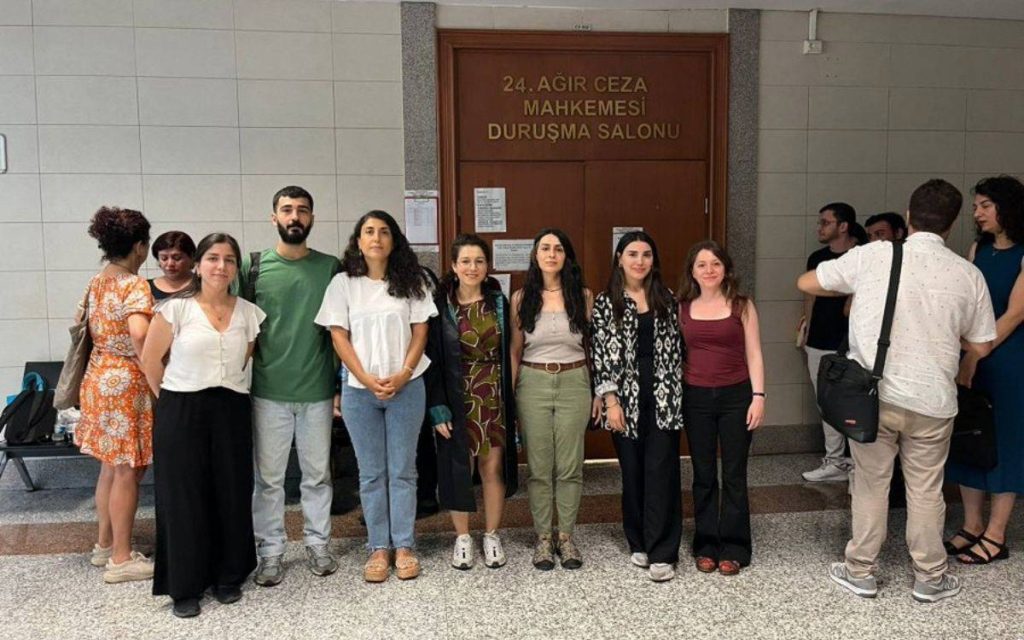The İstanbul 24th High Criminal Court recently held a significant hearing concerning journalist Rahime Karvar, where she faced serious accusations which many argue stem from her journalistic activities. Attended by her legal team, numerous fellow journalists, and representatives from various organizations, the session spotlighted the ongoing pressures confronting the press in Turkey. Karvar’s defense emphasized the critical nature of her reporting and its role in highlighting marginalized voices, framing the situation as an attack on journalism itself.
| Article Subheadings |
|---|
| 1) The Pressures Facing Journalists in Turkey |
| 2) Karvar’s Perspective on Journalism |
| 3) Legal Implications of Reporting |
| 4) Women’s Rights and Self-Defense |
| 5) The Role of the Judiciary in Political Matters |
The Pressures Facing Journalists in Turkey
The current political climate in Turkey has posed considerable challenges for journalists working within the nation. Many feel that their rights are being systematically violated, often in direct retaliation for their investigative work. As officials crack down on dissent and independent reporting, those involved in media find themselves caught in a complex web of legal hazards. Reports indicate that a significant number of journalists have faced trials, penalties, or even imprisonment in recent years, underscoring the tight grip on freedom of expression in the country. The presence of organizations like the Mesopotamia Women Journalists Association and Dicle Fırat Journalists Association at the hearing reflects the broader solidarity within the media community against these relentless pressures.
Karvar’s Perspective on Journalism
In a powerful defense, Rahime Karvar asserted that her detention exemplified the undue pressure facing the press. She referenced George Orwell, who famously stated that journalism involves publishing truths that authorities would rather keep hidden. By this definition, Karvar positioned her work not only as essential but as a moral obligation to bring attention to those who struggle in silence. Highlighting marginalized groups—such as women, LGBTI+ individuals, and ethnic minorities—she stated,
“What is being presented as a crime is the very essence of journalism.”
This powerful assertion emphasizes the core role of journalism: to shine light on the issues that society often overlooks.
Legal Implications of Reporting
The court proceedings included serious concerns regarding the legal framework under which Karvar’s reporting was interpreted. Specifically, her coverage related to the well-known political figure Abdullah Öcalan was scrutinized as part of the evidence against her. According to Karvar, discussing state-sanctioned meetings cannot rightfully be construed as criminal activity. She pointedly questioned,
“How can reporting on a state-approved meeting be considered a crime?”
Her insistence on the legitimacy of her work raises critical questions about the intersection of journalism and law in authoritarian environments. Many advocates argue that labeling journalistic activity as a crime stifles free speech and undermines the very foundation of democratic society.
Women’s Rights and Self-Defense
During her defense, Karvar also addressed broader issues related to gender equality, announcing that in the early months of the year alone, 234 women fell victim to male violence. She explicitly stated,
“Women’s self-defense is not a crime – it’s a necessity.”
This powerful declaration underscores the complex interplay between violence against women and their right to speak out, pushing for societal recognition of women’s rights to autonomy and protection. By framing her journalistic endeavors around such critical social issues, she defends not just her work but also the essential narratives that often remain untold.
The Role of the Judiciary in Political Matters
Criticism extended beyond the actions against Karvar to encompass the broader implications of judicial authority. Serhat Çakmak, Co-Chair of the Association of Lawyers for Freedom, emphasized that the judiciary ought not to be a political apparatus aimed at silencing dissent. He noted that Karvar’s involvement in political discussions should be considered part of her job as a journalist, rather than a criminal act. This perspective challenges the appropriateness of using legal mechanisms to resolve political disputes, advocating for a clearer separation between the press’s investigative responsibilities and state interests. Following the hearing, the court ordered Karvar’s release under judicial control, with the next session dated for July 17.
| No. | Key Points |
|---|---|
| 1 | The hearing highlighted ongoing pressures on journalists in Turkey. |
| 2 | Karvar’s defense centered on the importance of journalism in bringing marginalized issues to light. |
| 3 | Karvar questioned the legality of using her reporting as evidence of a crime. |
| 4 | Her statements emphasized women’s self-defense against violence as a right, not a crime. |
| 5 | Critics argued that the judiciary should not interfere in political matters. |
Summary
The hearing for Rahime Karvar represents a significant moment in the ongoing struggle for press freedom in Turkey. As she navigates the legal ramifications of her reporting, the case serves as a lens through which the broader societal tensions and challenges surrounding journalism, women’s rights, and political expression in Turkey can be perceived. It highlights the fight for the freedom to speak out against injustices, pressing the need for judicial neutrality and respect for journalistic integrity.
Frequently Asked Questions
Question: What are the main charges against Rahime Karvar?
Karvar faces accusations relating to her journalistic work, specifically allegations that her reporting includes elements considered unlawful under current Turkish laws.
Question: How does Karvar view her role as a journalist?
She perceives her role as essential for highlighting marginalized groups and issues, arguing that her reporting aligns with the fundamental principles of journalism to unveil hidden truths.
Question: What is the significance of women’s self-defense in her defense?
Karvar stresses that women’s self-defense against male violence should not be criminalized, framing it as a crucial right that needs societal acknowledgment and legal protection.
